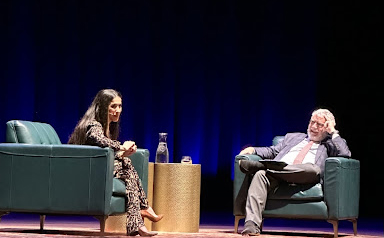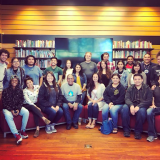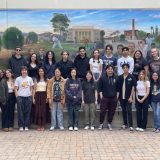Bringing ISIS to Justice: A Conversation with Nobel Laureate Nadia Murad
March 28, 2023
Chapman University and Wilkinson College of Arts, Humanities, and Social Sciences recently welcomed Nobel Peace Prize winner and human rights activist Nadia Murad, a Presidential Fellow in Peace Studies, to campus for a week of classroom visits, receptions, and a public event held in the Musco Center of the Arts. On March 13, Murad sat down with Chapman’s President Daniele C. Struppa for a conversation about her life and bringing ISIS to justice before 200 guests in attendance.
In 2014, Murad was kidnapped and sold into sexual slavery by ISIS. After escaping, Murad has dedicated her life to fighting for the reparations of people worldwide affected by war crimes and conflict, specifically sexual violence. She developed “The Murad Code”: a code of conduct for conflict-realted sexual violence, is the founder and President of Nadia’s Initiative: a non-profit organization that aims to support and rebuild communities in crisis, and was named by the United Nations as the first Goodwill Ambassador for the Dignity of Survivors of human trafficking. Murad’s story is shared in her book: The Last Girl: My Story of Captivity, and My Fight Against the Islamic State.
President Struppa asked Murad how she deals with the destruction of her hometown, Kojo, loss of friends and family, and horrors of war that she experienced. Murad replied that crimes of sexual violence are often viewed as “taboo”, or as “an unfortunate side effect of war.” She recounted that when she first tried to speak out and share her story, she was met with hesitation from family members, partly because there were no laws to protect survivors. But Murad felt it was important to fight the existing stigmas and be a voice for the thousands of women she left behind in captivity. She noted that we are “now finally seeing the international community recognize [sexual violence] as a war crime,” which is a credo to all of her advocacy work.
“There are different forms of justice, we are all survivors of sexual violence, but our stories are different,” she said.
She emphasized justice is not solely holding perpetrators accountable, but also about restoring a sense of normalcy, safety, and dignity for survivors. “Justice means we help survivors to have access to the things that they need,” she said.
For Murad, providing necessities for communities that have been victims of mass loss and destruction is essential. When she received the prize money from the Nobel Foundation, she put it towards her initiative, where she built a new hospital in Sinjar.
“In my work, when I do something, I want every person to benefit from it. I do more for survivors and make sure we bring justice for survivors, but through my projects, I care about everyone.”
She describes her global advocacy work as “survivor-centric,” in that survivors are involved the entire way, but her work is community focused. She talks about the building of the hospital, one of her foundation’s very first projects, as important because it was a “starting point for communities to share something.”
On top of all of her humanitarian work, Murad is also a current student at the American University in Washington, D.C., studying Peace Studies and Sociology.
“I like to sit in the back and observe what the students talk about, sometimes they will complain about how there is only Diet Pepsi and not Diet Coke,” to which she reassures them, “it’s okay… I promise you, we will fight and we will bring Diet Coke back.” The audience laughed. Maybe college students are similar nationwide. Though Murad has experienced unimaginable loss and trauma, she is able to keep a sense of humor.
At the end of the event, Murad stayed to sign books for over an hour, speaking individually with each student.
“Having this opportunity to speak with Nadia was truly extraordinary. It’s one thing to talk to someone who’s so knowledgeable and passionate, but it means so much more when they are genuinely a great person. It was an experience I’ll always remember,” said Ryan Klein, (24’ Peace Studies and History).
 Madeleen Sabeteer (24’ Broadcast Journalism & Documentary & French) attended the event as a photographer for her Humanities and FTV (film and TV writing production) 317 class “Unsung Stories”. Unsung Stories is a class that circulates around Murad and her story, co-taught by Dr. Lisa Leitz (Peace Studies) and Dodge Professor Christine Fugate.
Madeleen Sabeteer (24’ Broadcast Journalism & Documentary & French) attended the event as a photographer for her Humanities and FTV (film and TV writing production) 317 class “Unsung Stories”. Unsung Stories is a class that circulates around Murad and her story, co-taught by Dr. Lisa Leitz (Peace Studies) and Dodge Professor Christine Fugate.
“Being able to photograph her during these intimate and important moments meant so much to me, and I additionally was able to interview her for our class which will stay with me for the rest of my life! Nadia is doing crucial work for victims of CRSV (conflict-related sexual violence), and her story needs to be heard. I would do this a million times over if that meant her story and advocacy would be heard by the world.” Sabeteer said.
President Struppa described Murad’s story as “heartbreaking and heartwarming: heartbreaking because it shows the depth of human evil and what hatred can do, but heartwarming because of [her] story as a survivor and success.”
The Peace Studies Department, the Delt Wilkinson Peace Lecture series, and the Office of the President sponsored the event.
Photo Credit: Madee Sabatier Photography (@madeesfilms)


